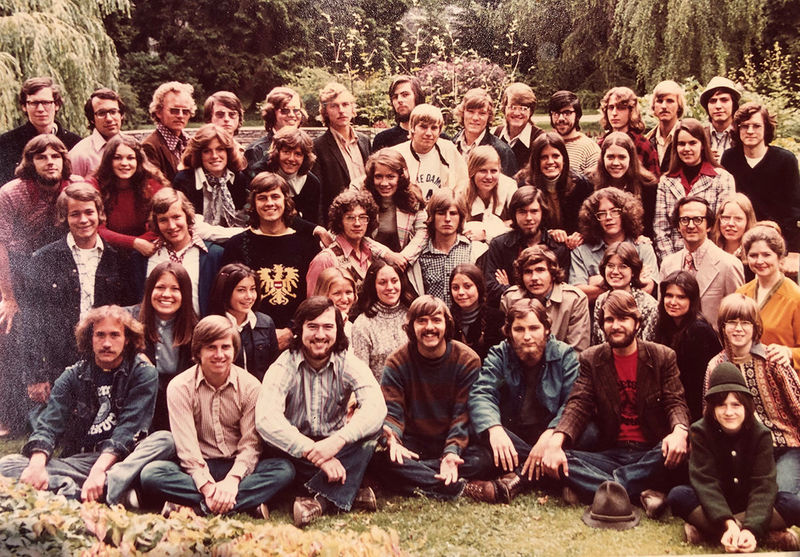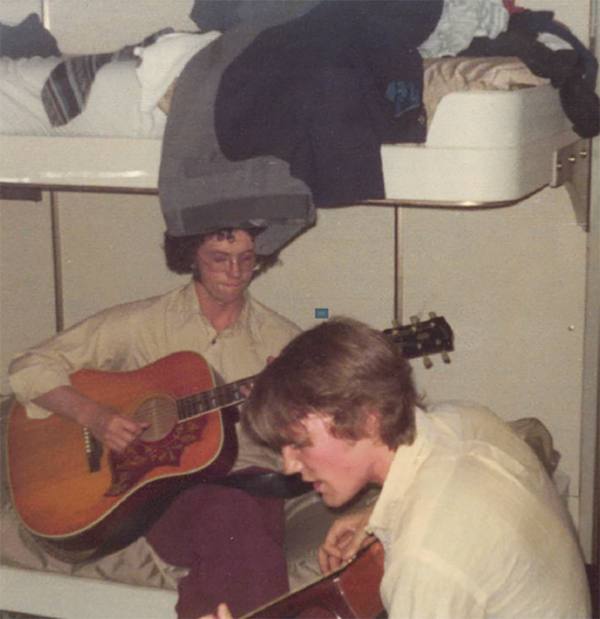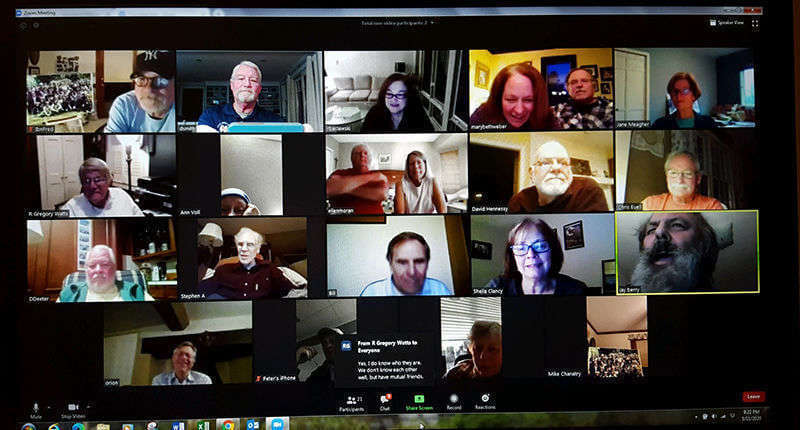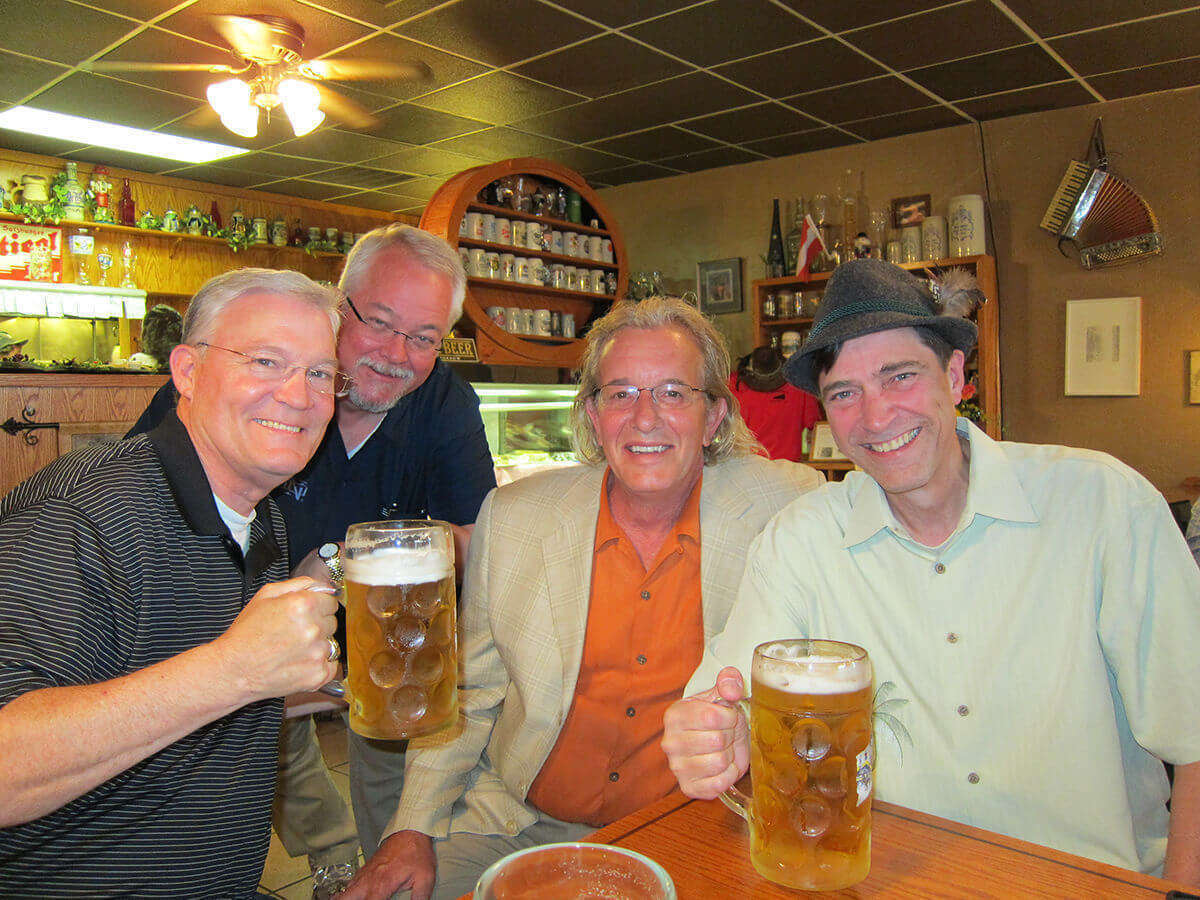 The Innsbruck group, 1974
The Innsbruck group, 1974
We were totally naïve in the ways of the world. Some took their first plane ride ever to get to New York City for our August 9, 1973 launch on the SS France for a week-long voyage across the Atlantic to begin our year abroad in Innsbruck, Austria. We landed in Le Havre, France, and spent a few days of cultural immersion in Paris before taking up temporary residency in Salzburg, Austria, for a six-week orientation program.
After orientation, we had free reign to travel for a week or so, with no guides or chaperones. Our only instructions were to make our way back to Innsbruck on the designated day to be assigned to our living quarters and start the school year. Today’s connected parents will find that much liberty as shocking and as foreign as Zoom would have been to our 19-year selves — and much more frightening.
At the time of that interlude, I had not yet developed the close friendships among the Innsbruck group that have lasted a lifetime. I listened briefly to what others were proposing to do during the break and decided to do my own thing. I recall having a goal of visiting Shakespeare’s Stratford-upon-Avon and maybe even making my way to the old sod of Ireland, but after finally arriving in London I realized I had not, in today’s terms, demonstrated good time management. The disappointment was outweighed by the yearning to rejoin everyone for the real start of the school year, and I set off for Innsbruck after a couple of lonely days in London.
Some memories from that solo trip are simply lost while others abound vividly after all these years. I recall the train ride from Brussels to the Belgian seaport of Oostende. (Frommer’s Europe on $10 a Day must have favored Oostende to Calais, France, as the better departure point for the ferry across the English Channel. The Chunnel between Dover and Calais was still a fantasy in 1973.)
Two memories come to mind. One is of a fellow train passenger pointing out WWII-era military bunker formations along the Belgian seaside. Until I consulted a map I assumed they had something to do with the D-Day Normandy invasion, only to discover later that Omaha Beach was 300 miles away. The other was the turbulent ferry ride across the Channel and the experienced passengers who knew where to position themselves downwind along the boat railing as they expunged their seasickness.
I only covered four countries on that short trip but over the next year the tally would add up to 17. Today it easily would have been more, but 1973-74 was well before the fall of the Soviet Union and its satellites. Travel to Hungary, Poland and the other nearby countries formerly known as Czechoslovakia and Yugoslavia was difficult and not recommended. (A few intrepid travelers succeeded.)
There were no websites to give us train itineraries, no YouTube videos with the layouts of train stations and the procedures for buying tickets, no iPhone app dictating real-time directions. We had to talk to railway workers and other travelers, often without a common language. Communication in that setting was nothing short of performance art.
During our Salzburg orientation session, and indeed for the entire year, we had no direct communication with our families back home. There was no long-distance telephone capability, apart from heavily orchestrated calls in extreme emergencies that were as expensive as they were fraught with the woeful glitches of the international system of the time. We wrote and received handwritten letters. That was it. My roommate remained faithful to his Notre Dame girlfriend (and now wife), writing letters almost daily. She did the same. They numbered their letters in sequence in case the postal system delivered them out of order, which happened often.

We arrived in Austria as strangers in a strange land. We needed each other because we had no one else. We did have the guidance of our beloved director Don Costello, along with his equally beloved wife, Christine, and their children, but it was a first-time experience for him, too, and he was learning on the job.
In Innsbruck I was assigned with 12 others to the Deutsches Heim guesthouse consisting of five double rooms and three singles governed by our stern but motherly Hausfrau, Frau Lener, who spoke no English.
Our housing arrangements formed many of the friendships that would endure for a lifetime. We had a communal breakfast at Deutsches Heim and fended for ourselves for lunch on a daily allowance of approximately $1.50 in cash. There were no credit cards or ATMs. The entire group met each evening for dinner in a banquet room at the Schwarzer Adler restaurant.
We were indeed full-time students, pursuing a typical Notre Dame curriculum. However, being overseas put us out of sight and largely outside of the reach of the school’s intangible aura of in loco parentis, which imposed guardrails for the campus community. Our separation from South Bend, our families and our comfort zones meant that our basic day-to-day sense of responsibility and accountability were primarily owed to each other.
That is not to say that everyone exercised those duties with the same measure or diligence. We were a diverse group with many personality types and socio-economic backgrounds. Loneliness and homesickness affected some more than others. Still, one thing was true of every one of us: we stuck to it and fulfilled our commitment. No one quit.
A mark of adulthood is the ability to make good decisions on one’s own, and the year abroad advanced us along that path. Closer friendships formed as a result of our living arrangements and as a consequence of travel. We learned from our mistakes and from each other as we shared information about places to go, places to stay, and places to avoid. We learned who was reliable and who had similar interests. We had to assess risk and danger in settings we had never encountered before. Traveling companionship provided mutual assurance and protection.
Holidays, long weekends and breaks offered ample opportunities for travel. We saved money on hotels by taking overnight trains. A favorite destination for me was Rome, a direct route south from Innsbruck, through the Brenner Pass and into Italy. Through some pre-existing relationships we developed friendships with Saint Mary’s students in the Rome program and shared their passion for the “Birdman’s” gelato at Piazza Navona and calzones at El Delfino restaurant (still operating today), across the street from the Hotel Tiziano where most of them lived.
For the two-week semester break in February, we purchased Eurail passes that gave us unlimited train travel. My traveling companion, Dave, and I headed south to Rome and Sicily, before returning on a counterclockwise itinerary that included Barcelona, Paris, Amsterdam, Copenhagen, Stockholm and Oslo.
The trip had an interesting mix of freedom and accountability. We had traded itineraries with others beforehand and accomplished the feat of meeting up with two other friends in Copenhagen for the Scandinavian portion of the trip. One of the guys had hosted a Swedish exchange student in high school and we all descended on her home in Göteborg for a visit before continuing to Stockholm. When we got to Oslo we had time for only one last excursion. One of us noticed that there was a northbound train that would take us to Trondheim, Norway, and another train from there that would take us to Bodø, north of the Artic Circle. We decided, “Why not?” and commenced an 18-hour overnight trip, watching the landscape change from timberland forest to subarctic wilderness as we passed the tree line and then the Arctic Circle. It is a destination more worthy of saying you did it than actually doing anything there. We stepped out, walked around a bit in the thin air and got back on the very same train for the reverse trip to Oslo and then home to Innsbruck.
It was a brotherly-sisterly experience. We looked out for each other. Prior to one long holiday weekend, I heard that two women in the group wanted to go to Berlin but were hesitant to travel there by themselves. I said I was interested and off we went. In 1974, the Iron Curtain existed in its full figurative dimensions and the Berlin Wall existed in its very real form. Train routes through Communist East Germany were limited. If memory serves, we had to travel north to Hannover, and then due east toward Berlin. At every stop along the way in East Germany, armed guards with assault rifles roamed outside and watched each train car to make sure no interloper jumped on to try to achieve the safe destination of West Berlin. In Berlin we walked through Checkpoint Charlie to spend a couple of hours in the drabness of East Berlin for a stark lesson in the realities of Soviet suppression.
We had to be flexible and patient. In the South Tyrol area of Italy, signage and town names were still displayed in the Italian and German languages as vestiges of the mixed cultural heritage created by Italy’s annexation of the formerly Austro-Hungarian area after World War I. On a Sunday return to Innsbruck from a trip to Rome, we were ordered to disembark in the town of Bolzano/Bozen. We eventually cobbled up enough information to learn that the Italian railroad workers were on strike. As we began to take inventory of the situation, both financially and in terms of the expectation that we needed to be in classes on Monday morning, we observed a general sense of calm and an overall lack of urgency among fellow passengers and rail workers. “It won’t last long,” we were told. And they were right. Whatever the grievance, it was resolved in just an hour or two, and we were escorted back onto the same train to complete the trip to Innsbruck. It has become almost a mantra to me that life, like a card game, involves strategy and smarts, but you have to play the cards as they are dealt.

It is a big world. The year abroad taught me that I am a very small part of it and that it does not revolve around me, that the essence of civilization is a shared humanity. Strange places and people became less strange over time.
And then it ended. As the semester drew to a close in June 1974, we had been abroad for almost 11 months. Only now, decades later, can I appreciate the gratitude that moment deserved. Back then it was merely a sober realization that we were moving on to the next stage in life. We said an emotional goodbye to Innsbruck and made our way back to Le Havre where we returned on the same SS France to New York, then home. It was hard to let go of the past year and readjust into family and social norms. I found much peace in the solitude of the golf course that summer.
Home was not the only thing I had to figure out. In the same way that we converged abroad in 1973 after separate freshman year experiences, the Innsbruck group returned in 1974 to the mainstream of Notre Dame life as juniors, no longer a distinct cohort. We had missed a year and we had to assimilate for the third time. We had to rely on a different network of friends.

In the same way that circumstance had plopped us down in a strange place and wound us into a tightly knit group the year before, the return to campus created a fast unwinding and dispersion into a place with only faux familiarity. We would see each other, of course, and some of the subgroups remained intact, but after one or two welcome back events, I don’t think we ever met again socially as an entire group during the next two years on campus.
However, the common bond from the shared experience abroad never left us. There were two marriages from within the group and several have stood up for each other’s weddings. We know each other’s children, watched them grow, attended their weddings and celebrated as they had children of their own. We have joined in mourning the deaths of our parents. For some, we have been the closest thing to family without being family. I have old photos of my traveling companion Dave’s infant son on my lap and recent Christmas cards from the same infant, now over 40 years old and himself a Notre Dame grad, with his wife and children.
The person who boarded the SS France on August 9, 1973 is the same person today, at least in my mind and in my memory. The only difference is that a lot of life has happened in between. When the 1973-74 Innsbruck group meets, in person or by Zoom, each of us represents two people at the same time — the ripened senior citizens of today and the 19-year-olds of almost a half-century ago, innocently stepping out on the profound adventure that would help us find our way.
Dan Joyce lives in Buffalo, New York, with his wife, Julie, and son Will, a high school senior. He is the father of Laura ’06 and Stephen ’08, and the grandfather of four beautiful grandchildren.